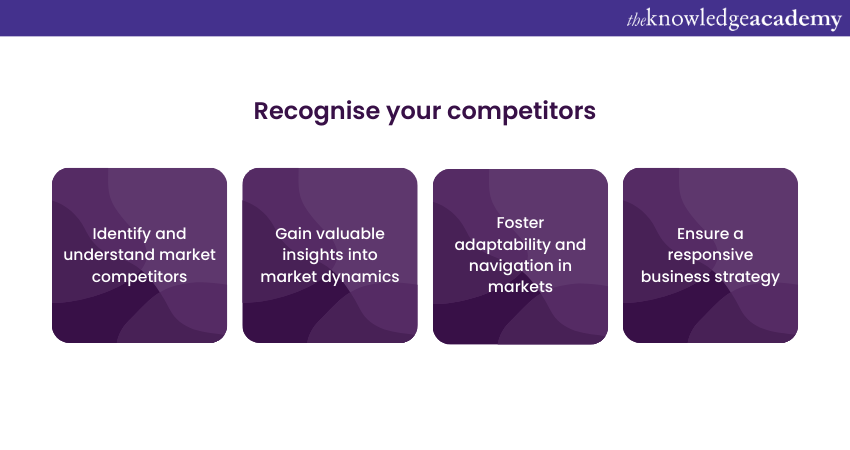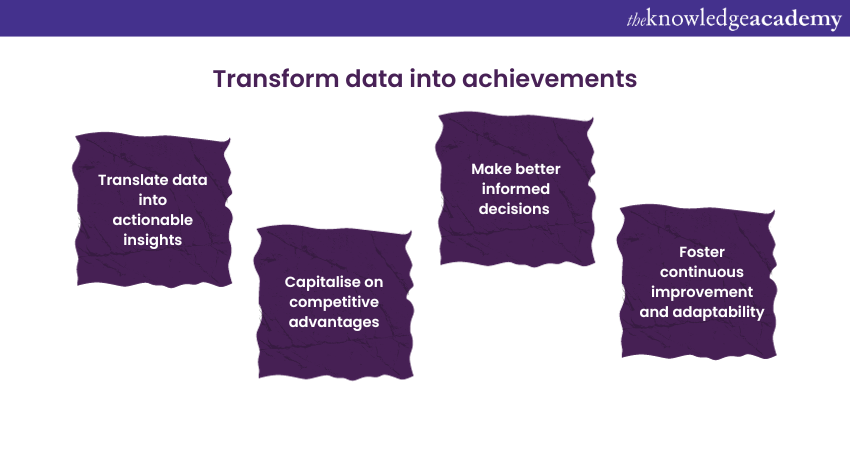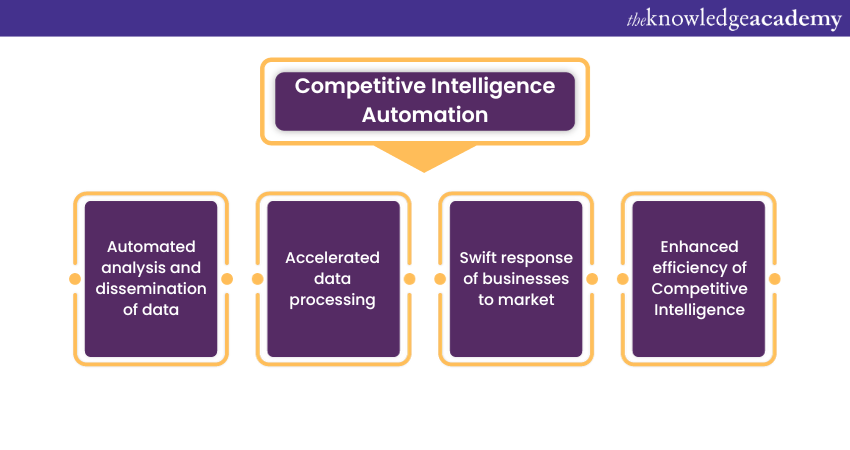We may not have the course you’re looking for. If you enquire or give us a call on +41 315281584 and speak to our training experts, we may still be able to help with your training requirements.
Training Outcomes Within Your Budget!
We ensure quality, budget-alignment, and timely delivery by our expert instructors.

The Competitive Intelligence Process is a linchpin, offering a systematic approach to gathering, analysing, and leveraging information crucial for informed decision-making. As markets evolve, embracing a dynamic Competitive Intelligence Process becomes imperative.
This process empowers organisations to decipher market trends, track competitors, and unlock insights that propel them ahead in the competitive market. The Competitive Intelligence Process involves gathering, analysing, and using competitor data for informed business decisions.
Table of Contents
1) What is a Competitive Intelligence Process?
2) Aspects of a Competitive Intelligence Process
a) Recognising your competitors
b) Identifying areas of interest
c) Collecting information
d) Developing a competitive analysis
e) Sharing findings and insights
f) Transforming data into achievements
3) Advantages of using Competitive Intelligence software in your process
4) Conclusion
What is a Competitive Intelligence Process?
The Competitive Intelligence (CI) Process is a systematic and ethical approach to gathering, analysing, and disseminating information about competitors, market trends, and industry dynamics.
Additionally, it involves the collection of data from various sources, such as public records, competitor websites, industry reports, and expert interviews. The goal is to gain insights into competitors' strategies, strengths, weaknesses, and emerging opportunities.
The CI Process typically includes four key stages: planning, data collection, analysis, and dissemination. In the planning phase, objectives are defined, and relevant sources are identified.
Now, during data collection, information is gathered and organised. The analysis phase involves evaluating and interpreting the data to extract meaningful insights. Finally, the dissemination phase involves communicating findings to decision-makers.
Moreover, a robust CI Process enables organisations to make informed strategic decisions, anticipate market trends, and maintain a competitive edge in business markets.
Aspects of a Competitive Intelligence Process
Competitive Intelligence is a strategic business practice involving systematically collecting, analysing, and disseminating information about competitors and market conditions. It empowers organisations to make informed decisions, anticipate industry trends, and gain a competitive advantage.
The CI Process consists of planning, data collection, analysis, and strategic dissemination of insights. Have a look at the various aspects in further detail:
a) Recognising your competitors

Recognising competitors is paramount in the Competitive Intelligence Process, serving as a cornerstone for informed decision-making. Businesses gain crucial insights into market dynamics, industry trends, and potential threats by identifying and understanding competitors.
This recognition enables proactive strategic planning, helping organisations refine their strategies, capitalise on competitors' weaknesses, and identify emerging opportunities. Continuous awareness of competitors fosters adaptability, positioning companies to navigate market shifts successfully.
Ultimately, recognising competitors within the CI Process is instrumental in sustaining competitiveness, fostering innovation, and ensuring a responsive business strategy.
Use your expertise to fuel competitive strategies. Become our next Competitive Intelligence Analyst—apply now and make an impact!
b) Identifying areas of interest
Identifying areas of interest is a pivotal aspect of the Competitive Intelligence Process. It involves pinpointing specific domains crucial to a company's strategic goals, such as market segments, technologies, or geographic regions.
This targeted approach streamlines data collection, ensuring the gathered intelligence is directly relevant to the organisation's objectives. By honing in on key areas, businesses can allocate resources efficiently, track competitors effectively, and capitalise on emerging trends.
Moreover, this focused identification enhances the overall effectiveness of the CI process and facilitates more informed and timely decision-making, enabling companies to stay ahead.
Unlock insights and drive smarter decisions! Apply now for the Business Intelligence Analyst position and help transform data into actionable business strategies.
c) Collecting information
Information collection is a fundamental component of the Competitive Intelligence Process, involving systematically gathering data from diverse sources. This process encompasses competitor actions, market trends, customer feedback, and technological advancements.
The collected information is meticulously organised and analysed to extract valuable insights. Methods range from online research and surveys to expert interviews. A comprehensive data collection strategy is vital for obtaining a holistic view of the competitive landscape, enabling businesses to make informed decisions. This dynamic process ensures that organisations stay agile, anticipate changes, and position themselves strategically in the marketplace.
Ace your next interview! Prepare with these top Competitive Intelligence interview questions.
d) Developing a competitive analysis
Developing a competitive analysis is critical in the Competitive Intelligence Process. This involves synthesising gathered information to assess competitors' strengths, weaknesses, opportunities, and threats.
Furthermore, detailed evaluations encompass market share, product positioning, and strategic initiatives. A well-crafted competitive analysis provides actionable insights, guiding strategic decision-making.
Moreover, this process not only aids in understanding the competitive market but also identifies areas where a company can differentiate itself. Continuous refinement of the analysis ensures adaptability in dynamic markets, empowering organisations to respond to industry shifts and maintain a competitive edge proactively.
Unlock the power of data with the latest Business Intelligence platforms. Find the right solution for your business!
e) Sharing findings and insights
Sharing findings and insights is a pivotal aspect of the Competitive Intelligence Process, facilitating informed decision-making within an organisation. After meticulous analysis, the dissemination of intelligence involves conveying key insights to relevant stakeholders.
Additionally, this collaborative sharing extends beyond internal teams to encompass executives, product developers, and strategists. Timely and targeted communication ensures that the organisation collectively grasps the competitive market, enabling a unified response.
Moreover, it promotes a proactive approach, allowing businesses to capitalise on opportunities and mitigate potential risks. Additionally, sharing findings externally can enhance industry collaboration and partnerships.
Ultimately, the effective sharing of CI findings not only fosters a culture of strategic awareness within the organisation but also positions it to navigate the complexities of the market with agility and foresight.
Conduct data analysis and generate reports by signing up for our Business Objects Reporting Training now!
f) Transforming data into achievements

The transformation of data into achievements is the pinnacle of the Competitive Intelligence Process, converting raw information into actionable outcomes. Through rigorous analysis and strategic interpretation, data is translated into insights that drive tangible results.
Additionally, this transformation enables businesses to identify and capitalise on competitive advantages, optimise market positioning, and anticipate industry shifts. By aligning CI findings with organizational goals, companies can make informed decisions that lead to innovative product development, targeted marketing strategies, and enhanced operational efficiency.
Moreover, this process not only empowers teams to stay ahead of competitors but also fosters a culture of continuous improvement and adaptability. Ultimately, transforming CI data into achievements propels organisations toward success in the dynamic and competitive landscape, shaping their trajectory for sustained growth and excellence.
Discover the top tools for effective Competitive Intelligence. Enhance your strategic decision-making!
Advantages of using Competitive Intelligence software in your process
Competitive Intelligence software (CIS) is a powerful tool revolutionising how businesses navigate the competitive landscape. It offers a range of features, and its advantages extend across various facets of the business process.
1) Comprehensive market analysis
Competitive Intelligence software excels in conducting comprehensive market analysis by aggregating and analysing vast amounts of data from diverse sources. It provides a panoramic view of market trends, customer behaviour, and emerging opportunities.
Furthermore, automated data collection and real-time updates ensure that businesses stay current with market dynamics, enabling proactive decision-making. This comprehensive market analysis empowers organisations to identify untapped niches, assess potential risks, and make informed strategic choices, fostering a proactive and adaptive business approach.
Master the tools and techniques to harness data effectively by signing up for our Data Analysis Skills Taining now!
2) Competitor tracking
One of the primary benefits of Competitive Intelligence software is its ability to track competitors with precision. It monitors competitors' activities, product launches, marketing strategies, and customer feedback in real-time.
Additionally, this allows businesses to benchmark their performance, understand market positioning, and identify areas for improvement. Competitor tracking provides a strategic advantage by enabling companies to anticipate industry shifts and proactively adjust their own strategies.
Moreover, it helps businesses stay ahead of the curve, mitigate risks, and capitalise on opportunities, contributing significantly to maintaining a competitive edge in the marketplace.
Stay ahead of the competition! Learn what Competitive Intelligence is and why it's crucial for business success.
3) Competitive Intelligence automation

Competitive Intelligence software automates data collection, analysis, and dissemination, significantly reducing manual effort and human error. Automated processes ensure the continuous monitoring of competitors and market trends, providing timely updates and alerts.
Automation accelerates the pace of data processing, allowing businesses to respond swiftly to changing market conditions. By streamlining routine tasks, CI software frees up valuable human resources, enabling teams to focus on strategic decision-making and creative problem-solving. The automation aspect enhances the efficiency of the Competitive Intelligence Process, making it a dynamic and proactive tool in the business arsenal.
4) Sales and account management
CI Software contributes directly to sales and account management by providing valuable insights into customer behaviour, preferences, and competitor offerings. By understanding customer needs and expectations, sales teams can tailor their approach, enhancing customer satisfaction and loyalty.
Additionally, CI software helps identify potential clients and optimise sales strategies based on market trends and competitive positioning. It provides a wealth of information that arms sales teams with the knowledge needed to negotiate effectively, address customer concerns, and position products or services as superior in the market.
Uncover how Business Intelligence can transform your data into actionable insights. Learn more now!
5) User-friendly formats
Competitive Intelligence software presents complex data in user-friendly formats, making it accessible to an organisation's broader range of users. Visualisation tools, dashboards, and customisable reports simplify data interpretation, allowing technical and non-technical stakeholders to grasp key insights.
More importantly, user-friendly interfaces enhance collaboration by ensuring that insights are easily shared across teams, fostering a culture of knowledge sharing within the organisation. This accessibility democratises the use of Competitive Intelligence, making it a valuable resource for decision-makers at all levels.
6) Suitable for all
Competitive Intelligence software is scalable and adaptable to businesses of all sizes and industries. Whether a startup or a multinational corporation, the modular nature of CI software allows organisations to choose functionalities that align with their specific needs.
Furthermore, this scalability ensures that businesses can customise their CI strategy based on their resources and goals, making it a versatile tool for diverse industries and business models. From gathering basic competitive data to conducting in-depth market analysis, CI software accommodates varying levels of complexity, providing tailored solutions for different organisational requirements.
7) CMS Integration
Integration with Content Management Systems (CMS) is a key advantage of CI Software. This seamless integration allows businesses to consolidate data from various sources, including internal databases, industry reports, and online platforms.
By centralising information, CI software ensures that teams have a unified and holistic view of the competitive landscape. This integration not only streamlines data collection but also enhances the accuracy and reliability of the insights generated. It facilitates a more cohesive approach to decision-making, where information is not siloed but integrated into the broader organisational strategy.
Curious about a Business Intelligence Analyst’s earning potential? Check out the latest salary trends in your area!
Conclusion
In conclusion, Competitive Intelligence Software enhances organisational agility and strategic decision-making. Automating data processes, facilitating comprehensive market analysis, and fostering user-friendly collaboration optimises the Competitive Intelligence Process. Embracing this tool empowers businesses to navigate dynamic markets, ensuring a sustained competitive edge in today's evolving markets.
Develop your skillset as a Data Analyst by signing up for our Business Intelligence Reporting Course now!
Frequently Asked Questions
Upcoming Business Skills Resources Batches & Dates
Date
 Business Objects Reporting
Business Objects Reporting
Fri 10th Jan 2025
Fri 14th Mar 2025
Fri 9th May 2025
Fri 11th Jul 2025
Fri 12th Sep 2025
Fri 14th Nov 2025







 Top Rated Course
Top Rated Course



 If you wish to make any changes to your course, please
If you wish to make any changes to your course, please


